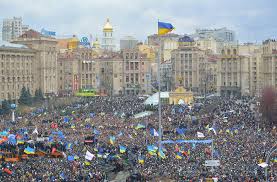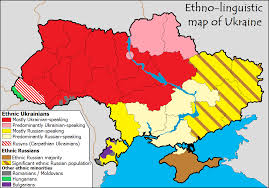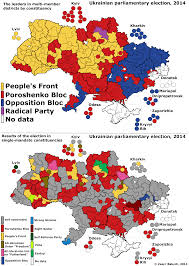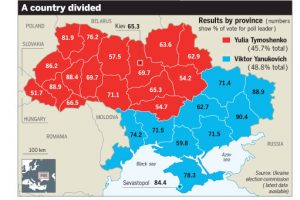The Ghosts of Ukraine
A year after the first protests in Kiev’s Maidan Square, the stakes in Ukraine are high, and increasingly more dangerous. The protests began in November 2013 after then president Victor Yanukovich backed down on a decision to sign a partnership deal with the European Union. In an abrupt turnabout, Yanukovich signed an accord with Russia for a $15-Billion bailout to help Ukraine’s ailing economy.
Based on the 2014 presidential elections, Ukrainians favour a strong, independent country. Economically, the western half favours closer ties with the European Union than the east. A sizable part of Ukraine’s industrial east feels an ancestral kinship with Russia. Separatists in the Donbas cities of Luhansk and Donetsk do not consider the government in Kiev to be legitimate, and would rather be with Russia.
A Harsh History
We gain a better understanding of this dynamic by looking into Ukraine’s history. In 1792, Galicia, the western part of Ukraine, became part of the Austro-Hungarian Empire. A year later, Catherine the Great crushed the Cossack rebellion in eastern Ukraine, extending the Russian Empire to the Black Sea. The First World War destroyed both the Austro-Hungarian and the Russian Empires. In 1917 the Bolshevik revolution under Vladimir Lenin began to consolidate its forces over the new Soviet Union. Several parts of Ukraine such as Western Ukraine, Central Ukraine, which includes the north, and Transcarpathia in the southwest, declared themselves independent. As Germany began to withdraw in 1919, the Bolsheviks tried to absorb Ukraine. The next four years was a succession of battles pitting Ukrainians against four external forces: the Red Army; Troops loyal to the Tsar; the German military; and the Polish army. In 1921 the Soviet Union emerged victorious over all but Western Ukraine, and Transcarpathia, which remained divided among Poland, Czechoslovakia, and Rumania.
Stalin
 Joseph Stalin assumed power after Lenin’s death in 1924. In 1929, Stalin moved to crush Ukraine’s spirit of independence. First he falsely accused more than 5000 Ukrainian scientists, religious and cultural leaders of fomenting armed rebellion. After executing or deporting them to Siberia, he brought in state-run collective farms by seizing the private livestock and agricultural lands of the Ukrainian people. He declared the most efficient and successful farmers as enemies of the people, deporting 11-million people to special colonies in Siberia. “In 1932 Stalin raised Ukraine’s grain procurement quotas by forty-four per cent.” (1) Under Soviet law no grain from a collective farm could be given to feed the farmers who grew it until the quota was met. At the peak of the famine in 1933, an estimated 25-thousand Ukrainians a day died of starvation. Stalin’s policy condemned between six million and seven million Ukrainians to death.
Joseph Stalin assumed power after Lenin’s death in 1924. In 1929, Stalin moved to crush Ukraine’s spirit of independence. First he falsely accused more than 5000 Ukrainian scientists, religious and cultural leaders of fomenting armed rebellion. After executing or deporting them to Siberia, he brought in state-run collective farms by seizing the private livestock and agricultural lands of the Ukrainian people. He declared the most efficient and successful farmers as enemies of the people, deporting 11-million people to special colonies in Siberia. “In 1932 Stalin raised Ukraine’s grain procurement quotas by forty-four per cent.” (1) Under Soviet law no grain from a collective farm could be given to feed the farmers who grew it until the quota was met. At the peak of the famine in 1933, an estimated 25-thousand Ukrainians a day died of starvation. Stalin’s policy condemned between six million and seven million Ukrainians to death.
In 1941, when German forces under Hitler invaded Ukraine, many Ukrainians, especially those in the west, joined them to fight against the Russians. Ukrainians living in the coal-mining east fought with Russian forces against the Germans.
Division in Ukraine
 This geographical split is also reflected linguistically. Ukrainian speakers live west of a roughly diagonal line extending from the south central part of the country to the northeast. Those who live east of the line tend to speak Russian. Based on the election results of 2004, 2010 and 2012, the collective memory of past allegiances is also reflected politically.
This geographical split is also reflected linguistically. Ukrainian speakers live west of a roughly diagonal line extending from the south central part of the country to the northeast. Those who live east of the line tend to speak Russian. Based on the election results of 2004, 2010 and 2012, the collective memory of past allegiances is also reflected politically.
In Ukraine’s presidential election in 2010, the vote between east and west was close. In western Ukraine, Julia Timoshenko of the Fatherland Party garnered 45.7 per cent of the vote. In western Ukraine, her rival, Viktor Yanukovich, representing the Party of Regions, won with 48.8 per cent of the vote. Yanukovich not only opposed closer ties with the European Union, he also opposed the Orange Revolution ten years earlier.
Extremists in Cabinet
At the time of the Maidan protests, two extremist parties, Svoboda, and Pravyi Sektor had a disproportionately high level of influence in the Yanukovich government. Although they had only 36 of 450 parliamentary seats, they held six of the 21 cabinet positions: The Minister in charge of National Security, Andriy Parubiy, was co-founder of Ukraine’s National Socialist Party, now called Svoboda, meaning Freedom. His assistant, Dmitri Yarosh, was head of Pravyi Sektor. Many hold him responsible for the violence in Maidan Square in February 2014. Vice-prime minister, Oleksandr Sych, was a member of Svoboda. Six members of neo-Nazi parties held the cabinet portfolios for National Security, the Economy, Education, Justice, Environment, and Agriculture. (2)
After violence erupted in Maidan Square on the 22nd of February, Yanukovich was ousted as president, and replaced by Interim President Oleksandr Turchynov. Ukraine’s parliament then immediately repealed a 2012 law that allowed the use of regional languages, including Russian. The controversial law was “perceived as taking away rights enjoyed by the Russian-speaking population, and potentially a sign that there might be growing discrimination against them.”(3) The repeal has since been vetoed. Russian is spoken by an estimated 24 per cent of the population.
Crimea
 A day after the violence in Kiev, pro-Russian demonstrations took place in Crimea. Four days later, unidentified Russian troops took up strategic positions across the peninsula. On the 16th of March 2014, Crimeans voted to join Russia. At the United Nations, thirteen members of the Security Council backed a resolution condemning the referendum as illegal. (4)
A day after the violence in Kiev, pro-Russian demonstrations took place in Crimea. Four days later, unidentified Russian troops took up strategic positions across the peninsula. On the 16th of March 2014, Crimeans voted to join Russia. At the United Nations, thirteen members of the Security Council backed a resolution condemning the referendum as illegal. (4)
In an address to the Federal Assembly of the Russian Federation, Putin said his patience with the west was at an end. He said that when the Soviet Union collapsed, NATO promised not to advance in Russia or in Ukraine. However, after a quarter of a century, Putin said it was time to act against what he considered an accumulation of western injustices and broken promises. According to Putin, Crimea has always been a part of Russia, which he wanted to restore after a long period of humiliation, referring to the collapse of the Soviet Union as “the greatest catastrophe of the 20th century.” (5) Putin maintains the United States and European Union crossed a red line in backing the government that emerged after Yanukovich fled the country, and after two days of violent clashes that resulted in the death of peaceful protesters. The Russian leader called it a deliberately orchestrated effort by anti-Russians and neo-Nazis, encouraged by foreigners. (6)
Putin maintains the United States and European Union crossed a red line in backing the government that emerged after Yanukovich fled the country, and after two days of violent clashes that resulted in the death of peaceful protesters. The Russian leader called it a deliberately orchestrated effort by anti-Russians and neo-Nazis, encouraged by foreigners. (6)
The Budapest Memorandum
In 1994 « Russia, the United Kingdom, and the United States promised that none of them would ever threaten or use force against the territorial integrity or political independence of Ukraine. They also pledged that none of them would ever use economic coercion to subordinate Ukraine to their own interest. » (7) That promise is contained in the Budapest Memorandum. The promise was made to Ukraine at an important moment, when it turned all its nuclear missiles over to Russia for destruction, and joined the nuclear non-proliferation treaty. For Ukraine, it was a considerable undertaking because it was giving up the world’s third-largest stockpile of nuclear weapons: more than Britain, France and China combined.
Efforts by the United States and the European Union to establish closer economic links with Ukraine came as Putin was trying to establish a customs union with Belarus, Ukraine, Kazakhstan, Kirghizstan and Armenia.
With the US, European Union and Russia all offering Kiev billions of dollars to entice Ukraine into a western or eastern economic zone, it’s a moot point as to which power, the US, the EU or Russia violated the Budapest Memorandum first. As to Ukraine’s territorial integrity, east and west are divided. The west sees it as a clear violation since Soviet President Nikita Khrushchev gave Crimea to Ukraine as a gift in 1954. Putin maintains the situation in Crimea was caused by an internal political-economic crisis, and that the Budapest agreement placed Russia under no obligation to force Ukrainians to remain in the country if they didn’t want to.
Four years after the parliamentary elections of 2010, the combination of protests, deaths, annexation of Crimea and conflict in Ukraine’s Donbas region, the stage was set for a change in government. In late July 2014, the coalition backing the Yatsenyuk government was dissolved. In calling a new election, Petro Poroshenko blamed many in the defunct parliament for the death of protesters, referring to them as “direct sponsors and accomplices of the militants/separatists”. (8) On the 26th of October 2014, Ukrainians voted for Poroshenko as their new president.
 The Petro Poroshenko Bloc won 182 seats, the People’s Front under Arseniy Yatsenyuk won 82 seats and Opposition bloc won 29 seats, mainly in eastern Ukraine. There was no vote in 15 constituencies in Donetsk and Luhansk. The lack of electoral participation by an estimated 1.8 million people leaves 27 seats of the 450-seat parliament vacant. The new government took effect on the 27th of November 2014, one year after protesters began their occupation of Maidan Square.
The Petro Poroshenko Bloc won 182 seats, the People’s Front under Arseniy Yatsenyuk won 82 seats and Opposition bloc won 29 seats, mainly in eastern Ukraine. There was no vote in 15 constituencies in Donetsk and Luhansk. The lack of electoral participation by an estimated 1.8 million people leaves 27 seats of the 450-seat parliament vacant. The new government took effect on the 27th of November 2014, one year after protesters began their occupation of Maidan Square.
Although the government has changed, and despite a ceasefire signed in September 2014, hostilities in Ukraine’s Donbas region continue. “In total, more than 4,300 combatants and civilians have been killed in eastern Ukraine since pro-Russian rebels seized border regions in April.” (9)
Western media reports from the area should raise disturbing questions about why the government is using extremist groups to try to quell the separatists. In a reference to Pravyi Sektor, The Telegraph of London reports: “As Ukraine’s armed forces tighten the noose around pro-Russian separatists in the east of the country, the western-backed government in Kiev is throwing militia groups – some openly neo-Nazi – into the front of the battle.” (10) Pravyi Sektor is one of two neo-Nazi groups in the earlier government to which Putin was referring when he justified his stance to defend Russian-speaking peoples.
The events in Ukraine in 2014 had a resounding effect on international relations. The United States and European Union imposed sanctions on Russia, which slowly began to have a negative effect on Russian commerce. International oil prices began to drop in the late summer and early fall of 2014. The timing of the slide in oil prices raises questions as to whether oil is being used as a geopolitical weapon against Russia. However, that is the subject of another article.
Russia’s foreign minister, Sergei Lavrov, says that calls by the west for more sanctions will “destroy the economy and cause public protests.” (11) In an address to the Foreign and Defence Policy Council in Moscow in late November 2014, Lavrov said “As for the concept behind the use of coercive measures, the West is making clear it does not want to force Russia to change policy but wants to secure regime change.” (12)
As east and west stick to their respective narratives, the gulf between them grows wider, leaving an uncomfortable sense of foreboding. Unless the ghosts of the Second World War resolve their differences peacefully, the conflict in Ukraine is likely to spread.
Bibliography
(1) US Library of Congress, Ukrainian Famine, Revelations from the Russian Archives, http://www.loc.gov/exhibits/archives/ukra.html
(2) Salem H. 04 March 2014, The Guardian, Who exactly is governing Ukraine?
http://www.theguardian.com/world/2014/mar/04/who-governing-ukraine-olexander-turchynov
(3) Ghosh, P., March 03, 2014, International Business Times : Watch Your Tongue : Language Controversy One of Fundamental Conflicts in Ukraine
www.ibtimes.com/watch-your-tongue-language-controversy-one-fundamental-conflicts-ukraine-1559069
(4) Galpin, R., March 15, 2014, BBC News, Ukraine crisis: Russia isolated in UN Crimea vote
http://www.bbc.com/news/world-europe-26595776
(5) Lee Myers S., Barry E., March 18, 2014, New York Yimes; Putin Reclaims Crimea for Russia and Bitterly Denounces the West
(6) Ibid
(7) Synovitz, R., February 28, 2014, Radio Free Europe, Explainer : The Budapest Memorandum And Its Relevance to Crimea; www.rferl.org/content/ukraine-explainer-budapest-memorandum/25280502.html
(8) Ibid Myers/Barry
(9) Evans R., November 20, 2014; Reuters, Ukraine death toll rises to more than 4,300 despite ceasefire: U.N.
www.reuters.com/article/2014/11/20/us-ukraine-crisis-un-idUSKCN0J40XC20141120
(10) Ursuf, T.P., The Telegraph, August 11, 2014, The Telegraph, Ukraine crisis: the neo-nazi brigade fighting pro-Russian separatists
(11) Rainsford, S., November 22, 2014; BBC News, Europe, Lavrov warns over Russia ‘regime change’ goal. www.bbc.com/news/world-europe-30158978
(12) Ibid
Tags: Budapest Memorandum, Crimea, European Union, Famine, Nazi, Poroshenko, Pravyi Sektor, Putin, Russia, Stalin, Svoboda, United States
